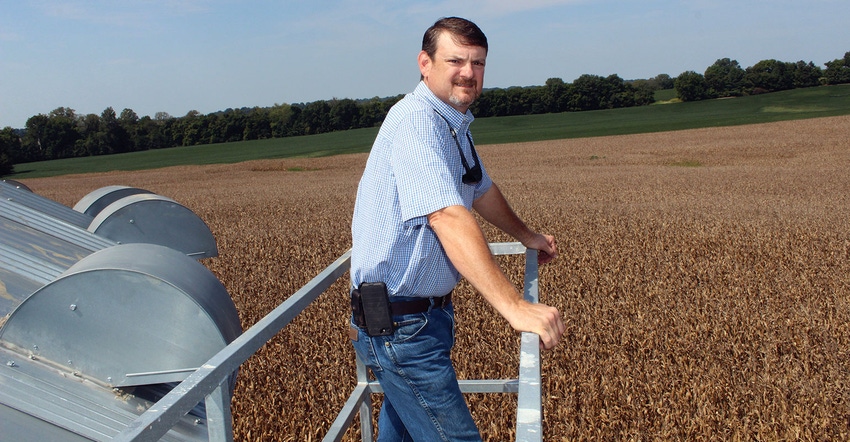
Fourth generation west Tennessee dryland grain farmer Eric Maupin knows he can make money with grain bins.
That's why he chose to invest in grain bins over digging irrigation wells when a Tyson Feed Mill expanded in his area, opening a new market for his commodity. Now he is enjoying 30 to 35 cents over the board price for his corn.
"I started looking into grain bins 10 years back and that's where I decided to make my capital expenditure because of the marketing opportunity with Tyson, and now with the Green Plains ethanol plant in Rives, Tenn., Maupin says.
He understands supply/demand and that providing corn to those two businesses helps his bottom line. "With my proximity to ports along the Mississippi River with Bunge and Cargill, I'm hoping to keep my basis strong moving forward," Maupin says. "If I do a good job of marketing, I can store my grain and sell it when the time is right while meeting my rent obligations to my landlords."
Farmers in Dyer County, Tenn., do a lot of shared rent. To ensure the accuracy of his harvest split, Maupin installed a truck scale in 2019. "You have to know what you're putting into your bins," Maupin says. "It's a multi-year investment but will pay for itself down the road."
The 3,000-acre farm also includes a cow/calf operation with about 70 head of mama cows. "I have some farms that are just better-suited for cattle," Maupin says. "I'm just trying to get the most value from every acre of my rolling Tennessee land."
Production issues
Land elevation varies across Dyer County, which limits furrow irrigation. Most irrigated operations use pivots. "I tried three times to dig a well on one farm but could never get the amount of water I needed so I make adjustments and farm dryland," Maupin says.
Each year he reviews state Official Variety Trial data and looks for drought-tolerant varieties. "I search for varieties that may not necessarily deliver top-end yields but will be consistent across my farms and pollinate under stressed conditions," Maupin says. "The last few years I've paid particular attention to test weight data of corn varieties. I had some this year that were through the roof, and that increases the per-bushel weight on each truckload."
After evaluating several soybean varieties the last few years, Maupin will plant those that have performed well in his varied clay and silt loam soils. He double-crops wheat and soybeans. "I'll get my wheat out toward the end of June and then plant soybeans right behind the planter," Maupin says. "They're late soybeans, but I know my soils and like getting two crops on the same acreage."
He conducts his own soil sampling because it keeps him more aware of the variances in his soils. He conducts grid samples every three years.
For Maupin, doing his own sampling is not so much about saving money but better understanding his fields, which helps him match varieties. It also helps him stay aware of developing problems like erosion, drainage issues or changing insect or weed complexes.
Resistance
Resistant weeds are a big problem for west Tennessee row crop farmers. "We're starting to see resistance develop in broadleaf weeds and grasses that we've not seen before," Maupin says. "We have more tools like stacked gene traits in our toolbox that are really helping, but I'm rotating crops so I can rotate modes of action to hopefully slow down resistance development."
Going into this season, he will use some of the newer herbicides like Enlist or dicamba. "I use them strategically to preserve their longevity the best I can," Maupin says. "I'm getting to the point now if I see a weed germinating in my field, I feel like I've already lost the fight."
Farming advice
The wet year pushed back planting and harvest, but Maupin remembers what an older farmer once told him: "I have farmed for 55 years and never failed to get a crop in or out," Maupin says.
2019 was a trying year for farming in general, but after tallying the books, Maupin says he would take another one just like it.
About the Author(s)
You May Also Like




